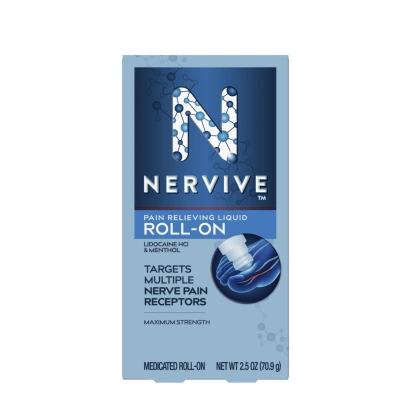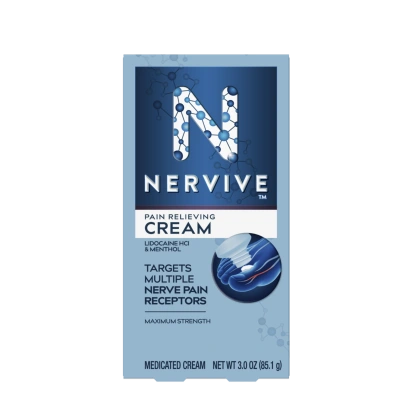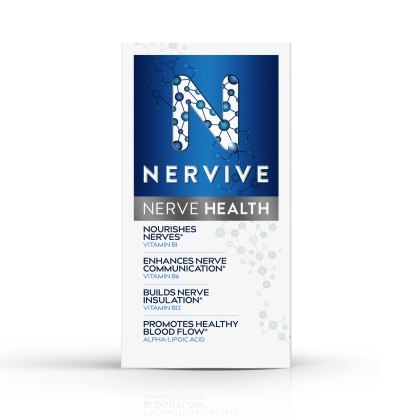3 Vitamins for Nerve Health
Your nervous system enables you to experience the world through your senses, to walk, talk, think, digest food, and perform every other activity that you do every day. Rapid, efficient, and responsive communication within the nervous system is vital for a healthy, productive life. Because it controls every bodily function, when nerve health is impaired, your health may be affected in many ways. The foundation of nerve health starts with ensuring that your nervous system receives the essential nutrients it needs.
3 Vitamins for Nerve Health
1. Vitamin B1
Vitamin B1, also known as thiamine, among numerous roles in maintaining health, is intricately connected with nerve function.1
Nerves are active cells that require a lot of energy and nourishment. One of the main functions of Vitamin B1 in the nervous system is to provide nerve cells with the energy they need by helping to extract energy from food and convert it into ATP, the form of energy that cells use directly.1
The recommended daily value for vitamin B1 is 1.2 mg.2
2. Vitamin B6
Vitamin B6, also known as pyroxidine, assists in the production of chemical messengers called neurotransmitters, such as serotonin, GABA, dopamine and glutamate that play a vital role in communication to and from nerves.3
The recommended daily value for Vitamin B6 is 1.7 mg.2
3. Vitamin B12
Vitamin B12, or cobalamin, builds nerve insulation and the myelin sheath that protects nerves.4
The recommended daily value of vitamin B12 is 2.4 mcg.2
How to Get Vitamins for Nerve Health in Your Diet
A balanced diet can often provide enough of these nutrients for maintaining healthy nerves.
- Vitamin B1 is present in a variety of foods, including whole and enriched grains, meats, and fish. Some of the best sources of vitamin B1 include: enriched white rice, which provides 117% of the daily value per ½ cup serving; enriched breakfast cereals, with 100% of the daily value; and trout, which provides 33% of the daily value per 3-ounce serving.5
- Vitamin B6 is also widely distributed in many foods. One cup of chickpeas provides 65% of the daily value, a 3-ounce serving of tuna 53% of the daily value, and one cup of marinara sauce provides 25% of the daily value.3
- Vitamin B12 occurs naturally in animal products. A 3-ounce serving of tuna provides 385%, one cup of 2% milk contains 54%, and an egg contains 19% of the daily value.4 For vegans, fortified nutritional yeast is an excellent option, with ¼ cup providing at least 346% of the daily value.4
Dietary Supplements for Nerve Health
Nervive Nerve Health supports nerve cells in these important ways:
- Nourishes and energizes your nerves with Vitamin B1*
- Nerve insulation that helps protect healthy nerves with Vitamin B12*
- Enhances nerve communication and neurotransmission with Vitamin B6*
Each serving of Nervive Nerve Health provides 1000% of the daily value for vitamins B1, B6, and B12. Nervive Nerve Health also supports healthy blood flow to the nerves* with 300 mg of alpha-lipoic acid per serving.
Nervive Nerve Relief is specially designed to help with occasional nerve aches, discomfort, & weakness due to aging*. With the aging process, natural changes in the body can negatively affect the peripheral nervous system including slowed nerve communication and loss of protective myelin.8 This can lead to occasional nerve aches, discomfort, and weakness.8 Each serving of Nervive Nerve Relief contains:
- 100% of the daily value of vitamins B1, B6, and B12 for nerve health*
- 600 mg of alpha-lipoic acid – an antioxidant that reduces nerve discomfort by over 50%* † after 4 5 weeks of daily use
Lifestyle Changes You Can Start Today to Support Nerve Health
Exercise to Promote Nerve Health
Your nervous system functions the best when there is a balance of incoming and outgoing messages. Healthy sensory stimulation helps your nervous system keep up its role as command center for the body. One of the best ways to support and maintain healthy nerves is through exercise.6 Exercise promotes nerve health in a number of important ways.
Adopt a Nerve-Healthy Diet
Your dietary choices can either help or hinder the health of your nervous system. A diet high in processed carbohydrates and saturated fats will deplete your body of essential nutrients, while a nutrient-dense diet that emphasizes whole, unprocessed foods provides your nervous system with the essential vitamins, minerals, amino acids, and essential fatty acids it needs to be healthy. 7
References
- B Vitamins in the nervous system: Current knowledge of the biochemical modes of action and synergies of thiamine, pyridoxine, and cobalamin - Calderón‐Ospina - 2020 - CNS Neuroscience & Therapeutics - Wiley Online Library. 2022 https://onlinelibrary.wiley.com/doi/full/10.1111/cns.13207
- Office of Dietary Supplements - Daily Values (DVs). 2022; Available from: https://ods.od.nih.gov/HealthInformation/dailyvalues.aspx.
- Office of Dietary Supplements - Vitamin B6. 2022 https://ods.od.nih.gov/factsheets/VitaminB6-HealthProfessional/
- Office of Dietary Supplements - Vitamin B12. 2022 https://ods.od.nih.gov/factsheets/VitaminB12-HealthProfessional/
- Office of Dietary Supplements - Thiamin. 2022 https://ods.od.nih.gov/factsheets/Thiamin-HealthProfessional/
- Frontiers | Emerging Relationships between Exercise, Sensory Nerves, and Neuropathic Pain | Neuroscience. 2022 https://www.frontiersin.org/articles/10.3389/fnins.2016.00372/full
- Nutritional Modulation of Immune and Central Nervous System Homeostasis: The Role of Diet in Development of Neuroinflammation and Neurological Disease. Nutrients, 2019. 11(5): p. 1076 https://www.mdpi.com/2072-6643/11/5/1076
- Influence of aging on peripheral nerve function and regeneration - Verdú - 2000 - Journal of the Peripheral Nervous System - Wiley Online Library. 2022 https://onlinelibrary.wiley.com/doi/full/10.1111/j.1529-8027.2000.00026.x



